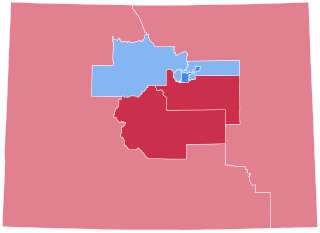
Douglas Lawrence Lamborn is an American attorney and politician who served as the U.S. representative for Colorado's 5th congressional district from 2007 to 2025. He is a member of the Republican Party. His district was based in Colorado Springs.

The 2006 United States House of Representatives elections in Colorado were held on November 7,2006,with all seven House seats up for election. The winners served from January 3,2007 to January 3,2009.

Don Marostica is a real estate developer and former legislator in the U.S. state of Colorado,currently serving as director of the state's Office of Economic Development and International Trade.

The 2008 congressional elections in Colorado were held on November 4,2008,to determine who will represent the state of Colorado in the United States House of Representatives,coinciding with the presidential and senatorial elections. Representatives are elected for two-year terms;those elected served in the 111th Congress from January 3,2009,until January 3,2011.

Douglas Edward Bruce is an American conservative activist,attorney,convicted felon,and former legislator who served as a member of the Colorado House of Representatives from 2008 to 2009.
Debbie Stafford is a Colorado legislator. First appointed to the Colorado House of Representatives as a Republican in 2000,Stafford was elected four times to represent House District 40,which encompasses Elbert County and rural Arapahoe County east of Aurora,Colorado. Noted for her work on animal welfare and children's issues,Stafford left the Republican caucus and joined the Democratic Party in October 2007.

Amy Stephens is a Principal in Public Policy and Regulation Practice at Dentons,a multinational law firm;previously,she served as Colorado House Majority Leader and House Minority Caucus Chairman in the Colorado House of Representatives.

John P. Morse is an American former politician who was a state senator in the Colorado Senate from 2007 to 2013,serving as president of the senate in 2013. He is a member of the Democratic Party. Morse represented Senate District 11,which encompassed at the time Manitou Springs,Colorado,and eastern Colorado Springs.

Stella Garza-Hicks is a former Republican legislator in the U.S. state of Colorado.

Marsha Looper was a Colorado legislator. Elected to the Colorado House of Representatives as a Republican in 2006,Looper represented House District 19,which encompasses eastern El Paso County,Colorado from 2006 to 2012.

Kent Douglas Lambert is a former legislator in the U.S. state of Colorado. A United States Air Force veteran,Lambert was elected to the Colorado General Assembly as a Republican in 2006. Most recently,he represented Senate District 9,which encompasses northwest Colorado Springs,the United States Air Force Academy,Monument and Black Forest.
Joe Rice is a former legislator in the U.S. state of Colorado,an Iraq War veteran,and a former mayor of Glendale,Colorado.

Victor Mitchell is an American businessman and former legislator in Colorado. Since 2008,he has been CEO of Lead Funding,a national real estate lender. Elected to the Colorado House of Representatives as a Republican in 2006,Mitchell represented House District 45,including Teller County and southern Douglas County,Colorado. Mitchell served one term in office and did not stand for re-election in 2008.

Dianne I. Primavera is an American politician who has been the 50th lieutenant governor of Colorado since 2019. A member of the Democratic Party,she previously served as the Colorado State Representative for the 33rd district from 2007 to 2011,and again from 2013 to 2017. Democratic gubernatorial nominee Jared Polis selected Primavera as his running mate,in the 2018 Colorado gubernatorial election.

The 2010 congressional elections in Colorado were held on November 2,2010,to determine who will represent the state of Colorado in the United States House of Representatives. Representatives are elected for two-year terms;those elected will serve in the 112th Congress.

The 2012 United States House of Representatives elections in Colorado were held on Tuesday,November 6,2012,to elect the seven U.S. representatives from the state,one from each of the state's seven congressional districts. The elections coincided with the elections of other federal and state offices,including a quadrennial presidential election. Primary elections were held on June 26,2012.

The 2014 United States House of Representatives elections in Colorado were held on Tuesday,November 4,2014,to elect the seven U.S. representatives from the state of Colorado,one from each of the state's seven congressional districts. The elections will coincide with the elections of other federal and state offices,including Governor of Colorado and U.S. Senator.

The 2018 United States House of Representatives elections in Colorado were held on November 6,2018,to elect the seven U.S. representatives from the state of Colorado,one from each of the state's seven congressional districts. The Republican and Democratic Party primaries in Colorado were held on June 26,2018. The elections coincided with the gubernatorial election,as well as other elections to the House of Representatives,elections to the United States Senate,and various state and local elections.

The 2020 United States House of Representatives elections in Colorado were held on November 3,2020,to elect the seven U.S. representatives from the state of Colorado,one from each of the state's seven congressional districts. The elections coincided with the 2020 U.S. presidential election,as well as other elections to the House of Representatives,elections to the United States Senate and various state and local elections.

The 2022 United States House of Representatives elections in Colorado were held on November 8,2022,to elect the eight U.S. representatives from the state of Colorado,one from each of the state's eight congressional districts. The elections coincided with the Colorado gubernatorial election,as well as other elections to the U.S. House of Representatives,elections to the U.S. Senate,and various state and local elections.

















